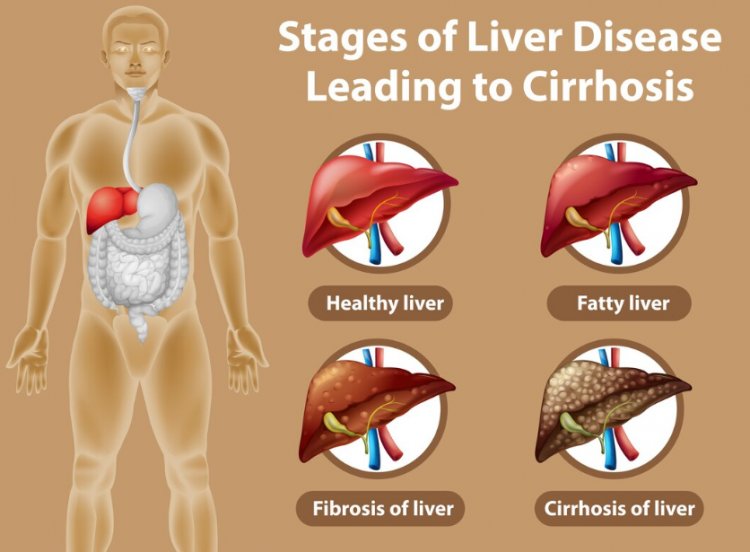Cirrhosis: Bridging Science and Hope for a Healthier Liver Future
Cirrhosis is a chronic liver disease characterized by the gradual replacement of healthy liver tissue with scar tissue, ultimately leading to impaired liver function. This condition is irreversible and can have serious implications for overall health if left untreated. Understanding the complexities of cirrhosis, including its symptoms, causes, stages, and treatment options, is essential for both patients and healthcare professionals alike.

Symptoms of Cirrhosis:
Cirrhosis can manifest a wide range of symptoms, although some individuals may remain asymptomatic until the disease has progressed significantly. Common symptoms include:
- Fatigue and Weakness: Cirrhosis can lead to decreased energy levels and overall feelings of weakness.
- Loss of Appetite and Weight Loss: Many individuals with cirrhosis experience a diminished appetite, which can result in unintentional weight loss.
- Nausea and Vomiting: Digestive disturbances, including nausea and vomiting, may occur as liver function declines.
- Jaundice: Yellowing of the skin and whites of the eyes is a hallmark sign of liver dysfunction.
- Abdominal Swelling: Cirrhosis can lead to fluid accumulation in the abdomen, resulting in swelling and discomfort.
- Leg Swelling: Edema, or swelling in the legs and ankles, may develop due to fluid retention.
- Itchy Skin: Pruritus, or itchy skin, is a common symptom of liver disease.
- Easy Bruising and Bleeding: Impaired liver function can lead to decreased production of clotting factors, resulting in easy bruising and prolonged bleeding.
- Confusion and Cognitive Impairment: In advanced stages of cirrhosis, hepatic encephalopathy can cause confusion, memory problems, and changes in behavior.
Causes of Cirrhosis:
Cirrhosis can develop as a result of various underlying liver diseases and risk factors. Some of the primary causes include:
- Chronic Alcohol Abuse: Excessive and prolonged alcohol consumption is a leading cause of cirrhosis worldwide.
- Chronic Viral Hepatitis: Hepatitis B and C viruses can lead to chronic liver inflammation and progressive liver damage if left untreated.
- Non-Alcoholic Fatty Liver Disease (NAFLD): Accumulation of fat in the liver, often associated with obesity, insulin resistance, and metabolic syndrome, can progress to cirrhosis.
- Autoimmune Hepatitis: In autoimmune hepatitis, the body's immune system mistakenly attacks liver cells, resulting in inflammation and scarring.
- Biliary Atresia: A congenital condition where bile ducts are absent or damaged, leading to bile buildup and liver damage, particularly in infants.
- Hemochromatosis: Hereditary disorder characterized by excessive iron absorption and accumulation in the liver, leading to cirrhosis.
- Wilson's Disease: Inherited disorder causing copper accumulation in the liver and other organs, leading to liver damage and cirrhosis if untreated.
- Primary Biliary Cholangitis (PBC): Chronic autoimmune condition affecting the bile ducts, leading to inflammation, scarring, and ultimately cirrhosis if left untreated.
Stages of Cirrhosis:
Cirrhosis is typically classified into several stages based on the extent of liver damage and the presence of complications:
- Compensated Cirrhosis: In the early stages, liver function may still be relatively preserved, and individuals may not experience significant symptoms. However, there may be underlying liver damage and scarring.
- Decompensated Cirrhosis: As cirrhosis progresses, liver function declines further, and complications such as ascites, hepatic encephalopathy, variceal bleeding, and hepatorenal syndrome may develop.
Treatment of Cirrhosis:
While cirrhosis itself is irreversible, treatment focuses on managing symptoms, slowing disease progression, and preventing complications. Treatment strategies may include:
- Lifestyle Modifications: Avoiding alcohol consumption, maintaining a healthy diet low in sodium, saturated fats, and refined sugars, and engaging in regular physical activity can help manage cirrhosis and improve overall health.
- Medications: Depending on the underlying cause and specific symptoms, medications may be prescribed. For example, antiviral medications may be used to treat chronic hepatitis B or C infections, while medications such as lactulose or rifaximin may be prescribed to manage hepatic encephalopathy.
- Liver Transplantation: In cases of advanced cirrhosis where liver function is severely compromised and complications are significant, liver transplantation may be necessary.
- Management of Complications: Complications such as ascites, hepatic encephalopathy, variceal bleeding, and hepatorenal syndrome require specific treatments tailored to each individual's needs.
In conclusion, Cirrhosis is a complex and potentially life-threatening condition that requires comprehensive management and ongoing medical care. Early detection, intervention, and adherence to treatment recommendations are crucial for optimizing outcomes and improving quality of life for individuals with cirrhosis. By understanding the symptoms, causes, stages, and available treatment options, patients, caregivers, and healthcare providers can work together to effectively manage this chronic liver disease.
#Cirrhosis #LiverHealth #LiverDisease #LiverScarring #ChronicLiverDisease #HepaticCirrhosis #LiverDamage #LiverFunction #HealthyLiver #LiverTransplant #LiverCare #LiverAwareness #CirrhosisAwareness #TreatmentOptions #Healthcare #MedicalScience #HealthyLiving #Wellness #DiseasePrevention #MedicalResearch
Disclaimer:
The information provided in this article is for educational purposes only and should not be considered medical advice. If you have any health concerns or are experiencing symptoms, it is important to consult with a healthcare professional, such as a doctor or clinic, for proper diagnosis and treatment. Always seek the advice of your doctor or other qualified health provider with any questions you may have regarding a medical condition. Do not disregard professional medical advice or delay in seeking it because of something you have read in this article.
What's Your Reaction?





















